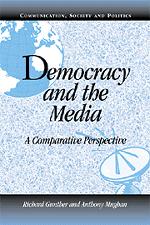Book contents
- Frontmatter
- Contents
- List of Contributors
- Acknowledgments
- 1 The Media in Democratic and Nondemocratic Regimes: A Multilevel Perspective
- 2 The Media and Politics in Spain: From Dictatorship to Democracy
- 3 Institutional Incapacity, the Attentive Public, and Media Pluralism in Russia
- 4 Democratic Transformation and the Mass Media in Hungary: From Stalinism to Democratic Consolidation
- 5 The Modernization of Communications: The Media in the Transition to Democracy in Chile
- 6 Media Influence in the Italian Transition from a Consensual to a Majoritarian Democracy
- 7 The United States: News in a Free-Market Society
- 8 Japan: News and Politics in a Media-Saturated Democracy
- 9 The Netherlands: Media and Politics between Segmented Pluralism and Market Forces
- 10 Great Britain: The End of News at Ten and the Changing News Environment
- 11 Germany: A Society and a Media System in Transition
- 12 The Political Impact of the Media: A Reassessment
- References
- Index
5 - The Modernization of Communications: The Media in the Transition to Democracy in Chile
Published online by Cambridge University Press: 05 June 2012
- Frontmatter
- Contents
- List of Contributors
- Acknowledgments
- 1 The Media in Democratic and Nondemocratic Regimes: A Multilevel Perspective
- 2 The Media and Politics in Spain: From Dictatorship to Democracy
- 3 Institutional Incapacity, the Attentive Public, and Media Pluralism in Russia
- 4 Democratic Transformation and the Mass Media in Hungary: From Stalinism to Democratic Consolidation
- 5 The Modernization of Communications: The Media in the Transition to Democracy in Chile
- 6 Media Influence in the Italian Transition from a Consensual to a Majoritarian Democracy
- 7 The United States: News in a Free-Market Society
- 8 Japan: News and Politics in a Media-Saturated Democracy
- 9 The Netherlands: Media and Politics between Segmented Pluralism and Market Forces
- 10 Great Britain: The End of News at Ten and the Changing News Environment
- 11 Germany: A Society and a Media System in Transition
- 12 The Political Impact of the Media: A Reassessment
- References
- Index
Summary
The weapons that served the bourgeoisie in bringing down feudalism will now be used against the bourgeoisie itself.
Karl Marx and Friedrich Engels, The Communist ManifestoThis chapter explores the various roles played by the mass communications media in the reestablishment of democracy in Chile and in the current process of democratic consolidation. These roles involve such functions as undermining popular support for the regime of General Augusto Pinochet, preserving political-cultural traditions and partisan identities, and, more recently, establishing a basic consensus in support of a pluralist democracy and a free market economy.
It is clear that the relationship between the communications media and the political process is not unidirectional. The media have an impact on the political process but, at the same time, changes in the politicalcultural and socioeconomic spheres have a significant influence on the field of communications. The reciprocal character of this relationship acquires particular relevance in a society like Chile, which in a short period of time changed from an authoritarian to a democratic regime, as well as from a closed economic system strongly regulated by the state to an open market economy.
The prevalent view of the Chilean communications media under the authoritarian regime emphasizes restrictions on freedom of expression and the mechanisms used by the regime to control the content and flow of information. In essence, this view focuses on the impact of the political system on the communications system, particularly concerning repression and ideological conformity.
- Type
- Chapter
- Information
- Democracy and the MediaA Comparative Perspective, pp. 165 - 194Publisher: Cambridge University PressPrint publication year: 2000
- 18
- Cited by



